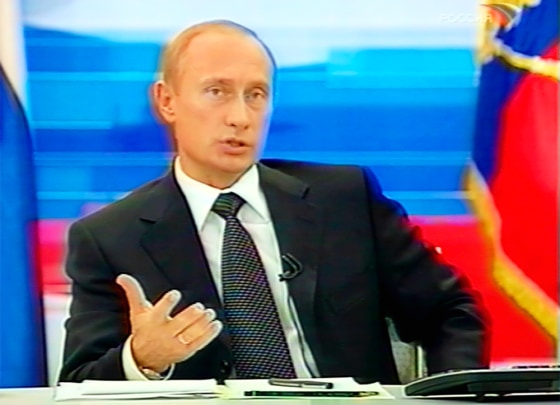Flanked by the Russian flag and two fawning moderators, President Vladimir Putin on Thursday fielded questions from a live audience across Russia's 11 time zones, confirming he will run for another four-year term. The lack of any criticism by ordinary Russians of his record as president confirmed what opinion polls here show: that Putin will win the March vote handily, and continue to strengthen his grip on the country.
Asked by a caller from the southern Russian region of Krasnodar whether he would seek a second term, Putin responded, "I will be a candidate. In time I will make an official announcement on this."
Putin's annual question-and-answer session with the Russian people was carefully scripted, and without follow-up questions.
Putin communicated by live television link, by phone and by Internet for the third year running, though this year's session carried more weight given it was taking place less than three months before presidential elections on March 14.
The Kremlin said more than 1 million questions were registered by phone and e-mail in advance of Thursday's session organized by state-run television, during which Putin showed a Clinton-like knack for detail. For three hours, he responded to dozens of questions about issues ranging from mortgages and subsidies for young families to problems faced by Russia's more than 300 ethnic groups.
Patriotism and publicity
The mix of patriotism and publicity in Thursday's question-and-answer session echoed a theme used frequently by the Russian president as he has garnered a record approval rating, even though the country faces deep economic difficulties a dozen years after the fall of the Soviet Union.
Putin declared that Russia was "a country that is standing firmly on its feet and developing intensively," promising over the next decade to double the economic output of Russia, where the average monthly salary is $185 and more than 30 million people live below the poverty line.
The president responded to a question from a caller about his family's use of foreign currency, which has insulated many here from the fluctuating Russian ruble over the last decade. Putin said he took pride in using only rubles, and his countrymen should do the same.
Putin's performance came less than two weeks after pro-Kremlin parties won control of Russia's parliament in a victory widely attributed to Putin's own popularity, ensuring the president easy passage of legislation in the Duma and a wider grip on power.
Though the Kremlin's manipulation of state-controlled media during those elections received widespread condemnation internationally, criticism in Russia has been muted.
Kremlin's heavy hand
While Putin on Thursday portrayed Russia as entering a new dawn of prosperity, others said they were seeing a different result of the Kremlin's control over many aspects of Russian life.
Olga Kryshtanovskaya, the author of a study that shows one in every four members of Putin's government has a background in the former KGB or Soviet military, said a Kremlin official visited her this week and demanded to know who was paying her for her research.
Kryshtanovskaya, a sociologist who has been studying the Russian elite for more than 15 years, said there was no threat from the official, but the Kremlin message was clear.
"First, there is pressure, a warning maybe. And then some kind of action," she said in her Moscow apartment. "Honestly, I am afraid. I guess it's a line that you're not supposed to cross. And I'm right on the precipice."
Besides overseeing a crackdown, under the guise of financial improprieties, of many of Russia's independent media, the Putin government has also taken a hard line on businessmen who amassed fortunes after the collapse of the Soviet Union in 1991.
Mikhail Khodorkovsky, Russia's richest man, has been jailed since October 25, when prosecutors effectively seized control of his oil company, Yukos. Khodorkovsky denies he owes billions in back taxes, and maintains that the Kremlin's thirst for greater control of the Russian economy is behind the accusations against him.
Little patience
During his phone-in show, Putin said he had little patience for Russia's powerful businessmen who have sought tax breaks for their stakes in Russia's energy sector.
Sociologist Kryshtanovskaya, who has received U.S. funding for some of her studies, sees Putin's heavy hand as a result of the security background of many members in his government.
"They believe that the government should be very powerful. This is not a democratic government. In Russia, in fact, a democratic government is seen as a weak government. A powerful government, for these kinds of people, is a government that controls everything."
NBC's Preston Mendenhall is based in Moscow.
